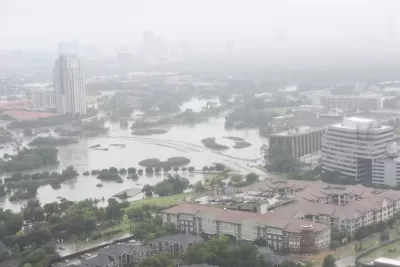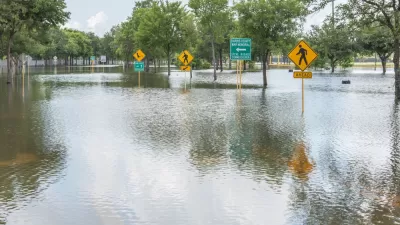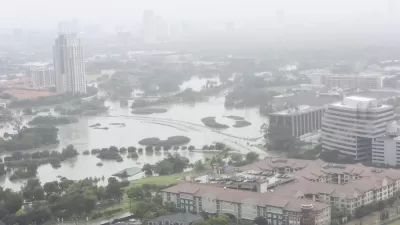As Houston's flood waters recede and attention turns from rescue to recovery and soon rebuilding, critics have pointed to the city's lack of zoning as the cause of the devastation. But are they looking in the right direction?

"As we watch Houston struggle with the catastrophic flooding associated with Hurricane Harvey’s biblical levels of rainfall, it is easy (from a safe distance, anyway) to get judgmental about the city’s famous lack of land-use planning," writes Ed Kilgore, political columnist for New York Magazine.
Houston legendarily has no zoning. The resulting haphazardness of its patterns of development, we may imagine, make the city a sitting duck for all sorts of disasters.
But doesn't a lack of zoning cause sprawl? If that was the only contributor, Planetizen's sprawl tag would only have articles pertaining to America's fourth largest city.
It’s true that Houston’s sprawl does invite problems, but it’s only partially true that the sprawl is a result of its lack of zoning...But the bigger problem is a lack of regional planning. Development has overwhelmed the city’s World War II–era reservoir system of flood control and consumed the wetlands that absorb excess rainwater.
Kilgore cites the now much-referenced ProPublica series, "Hell And High Water: Preparing Houston For The Next Big Storm."
"In Harris County alone, research by Texas A&M scientist John Jacob shows, almost 30 percent of freshwater wetlands were lost between 1992 and 2010, a figure he calls 'unconscionable,'" wrote three reporters: Neena Satija, The Texas Tribune and Reveal; Kiah Collier, The Texas Tribune; and Al Shaw, ProPublica.
Another insightful piece questioning the culpability of Houston's lack of zoning for the disaster was written by Henry Grabar, a staff writer for Slate’s "Moneybox."
The most important thing is this: No city is or should be designed to accommodate a one-in-a-million-year flood, which is what Harvey turned out to be.
For more discussion on whether zoning would have helped Houston whether the epic flooding caused by Hurricane Harvey, see blog post by Planetizen contributor Michael Lewyn.
FULL STORY: More Zoning Wouldn’t Have Protected Houston From Harvey’s Fury, But Less Sprawl Would Have Helped

Alabama: Trump Terminates Settlements for Black Communities Harmed By Raw Sewage
Trump deemed the landmark civil rights agreement “illegal DEI and environmental justice policy.”

Planetizen Federal Action Tracker
A weekly monitor of how Trump’s orders and actions are impacting planners and planning in America.

How Atlanta Built 7,000 Housing Units in 3 Years
The city’s comprehensive, neighborhood-focused housing strategy focuses on identifying properties and land that can be repurposed for housing and encouraging development in underserved neighborhoods.

In Both Crashes and Crime, Public Transportation is Far Safer than Driving
Contrary to popular assumptions, public transportation has far lower crash and crime rates than automobile travel. For safer communities, improve and encourage transit travel.

Report: Zoning Reforms Should Complement Nashville’s Ambitious Transit Plan
Without reform, restrictive zoning codes will limit the impact of the city’s planned transit expansion and could exclude some of the residents who depend on transit the most.

Judge Orders Release of Frozen IRA, IIJA Funding
The decision is a victory for environmental groups who charged that freezing funds for critical infrastructure and disaster response programs caused “real and irreparable harm” to communities.
Urban Design for Planners 1: Software Tools
This six-course series explores essential urban design concepts using open source software and equips planners with the tools they need to participate fully in the urban design process.
Planning for Universal Design
Learn the tools for implementing Universal Design in planning regulations.
Caltrans
Smith Gee Studio
Institute for Housing and Urban Development Studies (IHS)
City of Grandview
Harvard GSD Executive Education
Toledo-Lucas County Plan Commissions
Salt Lake City
NYU Wagner Graduate School of Public Service





























